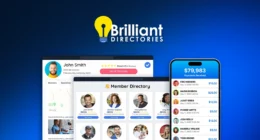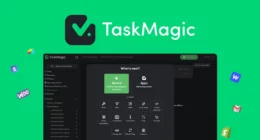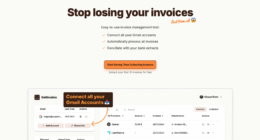Referral software helps small businesses grow by automating customer recommendations and rewards. These platforms typically include user-friendly dashboards, tracking systems, and flexible reward structures that integrate with existing business tools. Successful referral programs can increase customer acquisition 3-5 times compared to traditional marketing while reducing costs. Key features include fraud prevention, analytics tools, and automated reward disbursement. Small businesses can maximize their growth potential by exploring the right referral software solution for their needs.
Quick Overview
- Referral software increases customer acquisition 3-5x more effectively than traditional marketing while reducing overall marketing costs.
- Essential features include user-friendly dashboards, automated tracking, flexible rewards, and integration with existing business tools.
- Small businesses benefit from increased sales, stronger customer loyalty, and expanded brand reach without significant financial investment.
- Automated reward systems streamline program management and enhance participant satisfaction while preventing potential fraud.
- Successful implementation requires clear program goals, attractive incentives, and regular monitoring through analytics tools.
Understanding the Power of Referral Software

While many small businesses rely on traditional marketing methods, referral software has emerged as a game-changing tool for accelerating growth and customer acquisition. This powerful technology delivers remarkable results, increasing customer acquisition by 3-5 times compared to other marketing channels while providing a cost-effective approach to business growth. By implementing automated reward features, businesses can significantly enhance customer satisfaction and drive higher participation rates.
The impact of referral software extends beyond basic lead generation. Small businesses have witnessed substantial returns on investment, with companies like Toki Mats generating over $500,000 through their referral programs.
The software’s automation capabilities streamline processes, from tracking referrals to distributing rewards, while providing valuable analytics for program optimization. By leveraging word-of-mouth marketing through a systematic approach, businesses can build trust, enhance brand awareness, and create a sustainable pipeline of high-quality leads that contribute to long-term success.
Essential Features to Look for in Referral Platforms
Selecting the right referral software requires careful consideration of key features that align with business objectives. Modern referral platforms should offer essential capabilities in five core areas:
- User-friendly interface with an intuitive dashboard, customizable forms, and mobile responsiveness. Many platforms now include success manager support to help businesses optimize their referral programs.
- Automated tracking systems that monitor referral activity in real-time and prevent fraud.
- Flexible reward structures supporting multiple currencies and automatic disbursement.
- Thorough analytics tools for measuring campaign performance and ROI.
- Integration capabilities with existing business tools and e-commerce platforms.
Small businesses should prioritize platforms that offer these features while remaining scalable and cost-effective. The right combination of these elements guarantees successful referral program management, from easy campaign setup to detailed performance tracking.
Look for solutions that provide visual campaign builders and one-click sharing options to streamline the referral process.
Top-Performing Referral Software Solutions

Several high-performing referral software solutions have emerged as clear leaders for small businesses seeking to amplify their word-of-mouth marketing efforts.
ReferralCandy stands out with proven results, generating over $500,000 in referral revenue for Toki Mats, while offering convenient PayPal cash payments to advocates.
For businesses seeking all-encompassing solutions, Referral Rock delivers a “done for you” approach with robust automation and integration capabilities, including Salesforce and Stripe connectivity. These solutions are particularly cost-effective compared to traditional advertising methods while delivering superior results.
SaaSquatch combines advocacy marketing with powerful A/B testing features, making it ideal for data-driven companies.
Small businesses particularly appreciate HelloReferrals for its automated email templates and user-friendly interface.
InviteReferrals rounds out the top performers with its seamless e-commerce platform integrations, making it especially valuable for online retailers.
Maximizing ROI With Strategic Referral Programs
To maximize return on investment from referral programs, small businesses must implement strategic approaches that optimize both program structure and participant engagement.
The key lies in creating double-sided rewards that benefit both referrers and new customers, while implementing tiered incentives to encourage multiple referrals.
Successful ROI optimization requires careful tracking and analysis of key metrics, including conversion rates and customer lifetime value.
Small businesses should leverage their CRM systems to identify high-value customers and personalize referral offers based on purchase history. Viral Loops and similar software solutions can enhance referral program management efficiency. Integrating with Solid Performers CRM can provide comprehensive lead management capabilities while maintaining cost-effectiveness for Indian businesses.
Regular monitoring of program performance, combined with A/B testing of different incentives and messaging, helps fine-tune the program for maximum returns.
Integration with existing technology systems and automation of reward distribution further streamlines operations, reducing administrative costs while improving the overall participant experience.
Overcoming Common Referral Program Challenges

While establishing a referral program presents exciting opportunities for small businesses, several common challenges can hinder its effectiveness and growth. Understanding and addressing these obstacles helps create a more successful referral strategy. Word-of-mouth marketing remains one of the most powerful tools for attracting loyal customers to your business.
| Challenge | Solution |
|---|---|
| Fraudulent Referrals | Implement multi-step verification and fraud detection algorithms |
| Low Participation | Create engaging incentives and simplify the referral process |
| Poor Quality Referrals | Set clear criteria and monitor referral patterns |
| Program Stagnation | Regularly refresh incentives and maintain active communication |
Small businesses can overcome these challenges by focusing on three key areas: program security, user experience, and continuous engagement. Implementing proper verification processes prevents fraud, while a streamlined interface encourages participation. Regular updates to incentives and celebration of successful referrals help maintain program momentum and guarantee long-term success.
Measuring and Optimizing Referral Success
Successful referral programs depend heavily on accurate measurement and data-driven enhancement. Key performance indicators like share rates, conversion rates, and referral revenue help businesses track program effectiveness. The global benchmark shows that a 2.3% referral rate is considered average for most businesses.
Modern tracking tools such as ReferralCandy and Friendbuy make data collection seamless and actionable.
To calculate ROI accurately, businesses should compare program costs against new customer revenue while factoring in management expenses and incentives. Leading indicators of success include member activation rates, share frequency, and link clicks, with successful programs averaging 13 people reached per share.
For ideal results, businesses should:
- Set clear, measurable goals
- Implement attractive reward structures
- Create easily shareable content
- Monitor analytics consistently
- Distribute rewards promptly
Regular assessment of these metrics enables continuous improvement and maximizes program effectiveness.
Frequently Asked Questions
How Long Does It Typically Take to See Results From Referral Software?
Initial results from referral software can appear within 24-48 hours, though meaningful outcomes typically develop over time.
Most businesses see significant results within 1-3 months, with 60% reporting positive ROI during this period. Early indicators include increased customer engagement and initial referrals.
Long-term benefits become more substantial after 6+ months, when referral programs often contribute to 20-40% of new customer acquisition and show 200-400% ROI.
Can Referral Software Work Effectively for Service-Based Businesses?
Yes, referral software can work effectively for service-based businesses. It helps streamline word-of-mouth marketing by automating referral tracking and reward distribution.
Service providers can benefit from higher-quality leads since referred customers often have specific needs aligned with the business offerings. The software’s ability to integrate with existing systems and provide analytics helps measure success and adjust strategies accordingly.
For best results, businesses should guarantee the referral program maintains their service quality standards.
What Happens to Customer Data if We Switch Referral Software Providers?
When switching providers, customer data doesn’t simply vanish – but timing is vital.
Most referral software companies retain data for 30 to 180 days after cancellation, allowing time for export. Businesses can typically download their information in common formats like CSV or Excel, or use API access for transfer.
For smooth changeover, it is important to:
- Export data before canceling
- Verify compatibility with new system
- Test data integrity after migration
Are There Industry-Specific Referral Software Solutions Available?
Yes, several industry-specific referral software solutions are available to meet unique sector needs. Notable examples include ReferralCandy for eCommerce businesses, Hireology for recruitment, and Worktaps for retail and hospitality sectors.
Each platform offers specialized features tailored to industry requirements, such as:
- Industry-specific templates
- Customized reward structures
- Relevant integration capabilities
- Sector-specific compliance features
These specialized solutions typically deliver better results than generic referral software.
How Do Referral Programs Impact Existing Customer Service Workflows?
Referral programs greatly transform customer service workflows by automating key processes. They integrate with existing CRM systems to streamline data management, reducing manual entry and potential errors.
Service teams benefit from real-time access to referral data, enabling more personalized customer interactions. The automation of reward distribution and follow-up communications frees staff to focus on complex customer needs.
Additionally, integrated analytics dashboards help teams quickly assess program performance and make data-driven improvements.
Conclusion
Referral software has revolutionized how small businesses spread the word faster than a town crier in medieval times. By implementing the right platform, tracking metrics, and consistently optimizing referral campaigns, businesses can create sustainable growth through word-of-mouth marketing. Success lies in choosing software that aligns with company goals, maintaining engaging programs, and nurturing customer relationships. With proper execution, referral programs become powerful engines driving business expansion and customer loyalty.








